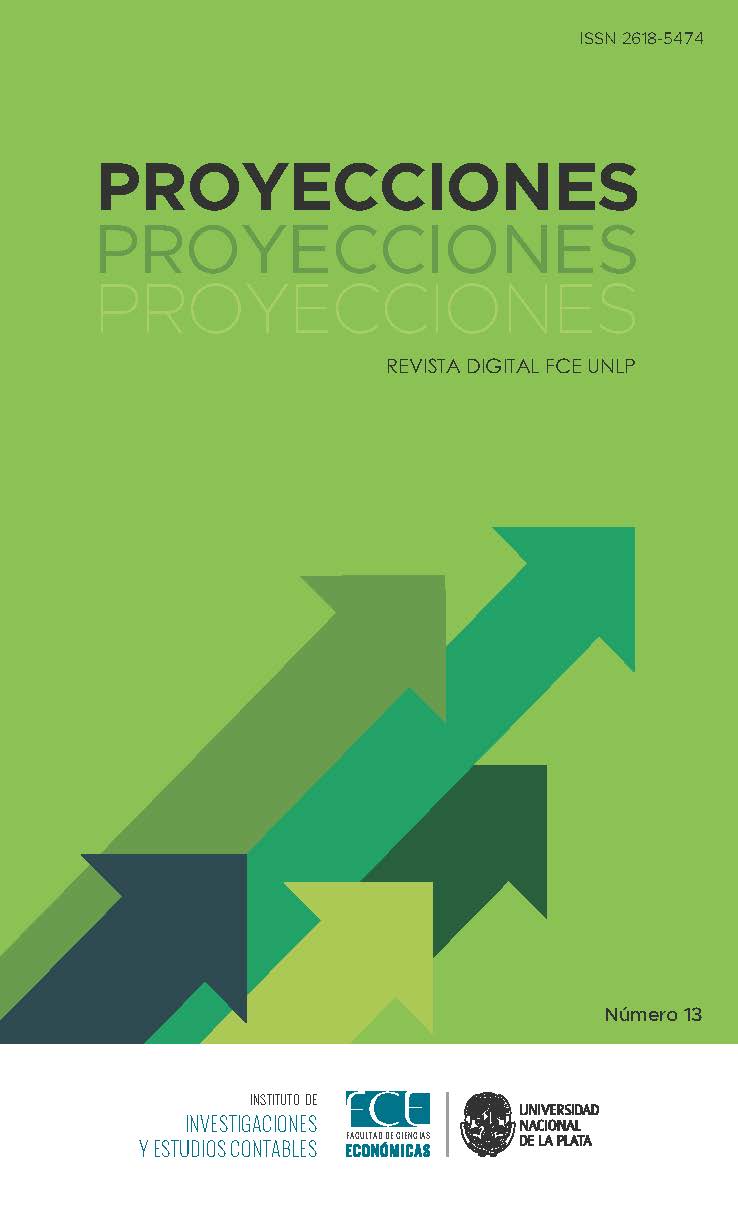Comparative analysis of sustainability reports of uruguayan public enterprises
DOI:
https://doi.org/10.24215/26185474e003Keywords:
Comparative analysis, Sustainability reports, Uruguay public enterprises, VisibilityAbstract
The Triple Bottom Line seeks to incorporate the environmental and social impacts an organization generates to their financial information. This incorporation takes place throughout diverse reports, among them sustainability reports; allow to communicate the economical, social and environmental impacts that an organization exerts on its context and community, allowing to measure through the variables and indicators the positive or negative incidence in these areas. The governments, and all their public corporations and managements should be pioneers and play a decisive role when it comes to developing, legitimating and consolidating Triple Balance patterns throughout different reports. Nevertheless, there is no evidence on how governments are incorporating the TBL in their reports, on how many companies and with what purposes. The goal of this study is precisely being able to describe what kind of reports public corporations from Uruguay elaborate and what is their content.
It is determined how many public enterprises report sustainability, how those reports become visible, what kind of report they publish and how often. As well, the obtained information is linked in the previously mentioned reports with the Principles of the United Nations Global Compact, the Sustainable Development Objectives, as well as the GRI Principles and Standards.
The source of information was the Uruguayan public enterprises’ websites, a revision of the Reports of Sustainability was made on the database of the Global Reporting Initiative (GRI) and on the Uruguay Social Corporate Responsibility website (DERES).
As a result, it can observed how at least 86% of Uruguay public corporations present reports with diverse characteristics, with no uniformity among them. However, there has been an evolution in the reports preparation, adopting more adequate denominations, incorporating content, and increasing the quantity and quality of information. On the other hand, in said reports certain subjects as the CSR, the principles of the United Nations, the SDO, the GRI principles and standards are not necessarily addressed, which means there is still remaining information to communicate the focus groups. At the same time, only a few public corporations elaborate properly sustainability reports and none of them presents an integrated report.
Downloads
Metrics
References
Administración de Ferrocarriles del Estado (s.f.). Memoria anual. Obtenida el 7 de agosto de 2019 de https://www.afe.com.uy/memoria-anual/
Administración Nacional de Puertos. República Oriental del Uruguay. (s.f.). Memoria Anual. Obtenida el 7 de agosto de 2019 de
http://www.anp.com.uy/inicio/institucional/memoria_anual/
Agencia Nacional de Vivienda. (2009-2019). Transparencia. Obtenida el 7 de agosto de 2019 de https://www.anv.gub.uy/grb/contenido.aspx?id_contenido=450
ANCAP. (s.f.). Pacto Mundial ONU. Obtenida el 9 de agosto de 2019 de
https://www.ancap.com.uy/innovaportal/v/292/1/innova.front/pacto-mundial-onu.html
Antel (s.f.). Memoria anual. Obtenida el 9 de agosto de 2019 de
http://www.antel.com.uy/institucional/nuestra-empresa/memoria-anual
Banco Central del Uruguay. (s.f.). Memoria - BCU. Obtenida el 9 de agosto de 2019 de https://www.bcu.gub.uy/Acerca-de-BCU/MemoriaBCU/Forms/AllItems.aspx
Banco de Previsión Social. (2019). Memorias y balances. Obtenida el 14 de agosto de 2019 de https://www.bps.gub.uy/5680/memorias-y-balances.html
Banco de Seguros del Estado. (s.f.). BSE. Obtenida el 14 de agosto de 2019 de https://www.bse.com.uy
Banco de Seguros del Estado. (s.f.). Informe de Gobierno Corporativo. Obtenida el 14 de agosto de 2019 de https://www.bse.com.uy/inicio/institucional/Transparencia/Informe-de-Gobierno-Corporativo/
Banco de Seguros del Estado (s.f.). Destacados. Obtenida el 16 de agosto de 2019 de
https://www.bse.com.uy/inicio/destacados/
Banco Hipotecario del Uruguay. (2019). Información financiera. Obtenida el 16 de agosto de 2019 de https://www.bhu.com.uy/institucional/informaci%C3%B3n-financiera/
Banco República. (2019). Memorias Anuales. Obtenida el 21 de Agosto de 2019 de https://www.brou.com.uy/web/guest/institucional/memoria-y-calificacion-de-riesgos
Centro de Información Oficial (2010). Decreto 232/2010 Reglamentación de la ley sobre el derecho de acceso a la información pública de la República Oriental del Uruguay. Obtenida el 21 de agosto de 2019 de
https://www.impo.com.uy/bases/decretos/232-2010/3
Chávez, D. y Torres, S. (Eds.).(2013). La reinvención del Estado. Empresas públicas y desarrollo en Uruguay, América Latina y el mundo. En Chávez, D. y Torres S. (Ed.), La reforma de las Empresas Públicas en Uruguay: Una mirada desde la Historia Económica, 152. Montevideo, Uruguay: Editorial: Chávez, D. y Torres, S.
Correo Uruguayo. (s.f.). Desarrollo sostenible. Obtenida el 23 de agosto de 2019 de https://www.correo.com.uy/desarrollo-sostenible
DERES (s.f.). DERES. Obtenida el 23 de agosto de 2019 de https://deres.org.uy/deres/).
DERES (s.f.) Memorias y reportes Uruguay. Obtenida el 28 de agosto de 2019 de https://deres.org.uy/docs/reportes/
Elkington, J. (1998 a). Cannibals With Forks: The Triple Bottom Line of 21st Century Business. Gabriola Island, Canada: Stony Creek, Conn. New Society Publishers.
Elkington, J. (1998 b). Accounting for the Triple Bottom Line. Measuring Business Excellence, 2(3), 18-2
GRI (Global Reporting Initiatives). Sustainability Reporting Guidelines. Versión 3. Amsterdam, 2000-2006.
Global Reporting Initiative (2016). Sustainability Disclosure Database. Obtenida el 12 de julio de 2019 de https://database.globalreporting.org/search/
Henderson, D. (2001). Misguided Virtue: false notions of Corporate Social Responsibility. Wellington, New Zealand: Business Roundtable.
Instituto Nacional de Colonización. (s.f.). Institucional. Obtenida el 28 de agosto de 2019 de https://www.colonizacion.com.uy/institucional
Mazzucato, M. (2014). El Estado Emprendedor: mitos del sector público frente al privado. Barcelona: RBA Editores,
Naciones Unidas Uruguay. (2019). Objetivos de Desarrollo Sostenible en Uruguay. Obtenida el 30 de agosto de 2019 de https://www.onu.org.uy/ods-en-uruguay/
Norman y McDonald (2004). Business Ethics. Quarterly, Volume 14, issue, 243-262.
Obras Sanitarias del Estado – Uruguay (2001-2019). Responsabilidad Social. Obtenida el 26 de julio de 2019 de http://www.ose.com.uy/ampliacion-de-resultado/responsabilidad-social-2231
Oficina de Planeamiento y Presupuesto, República Oriental del Uruguay. (s.f.). Portal de Transparencia Presupuestaria. Obtenida el 26 de julio de 2019 de
Downloads
Additional Files
Published
How to Cite
Issue
Section
License
El material publicado en la revista se distribuye bajo una licencia de Creative Commons de Atribución-NoComercial-SinDerivadas 4.0 Internacional (CC BY-NC-ND 4.0). Esta licencia obliga a otros a dar crédito de manera adecuada, brindar un enlace a la licencia, e indicar si se han realizado cambios; no permite hacer uso comercial de la obra; y si se remezclara, transformara o creara otro material a partir de la obra, no podrá ser distribuida esa modificación.




























